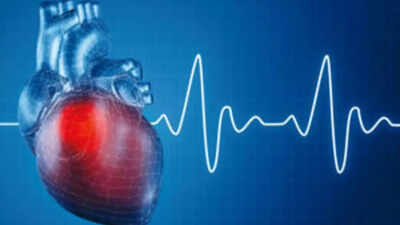ARTICLE AD BOX

Heart diseases can strike unexpectedly, at any age, and may not present typical symptoms like chest pain. Heart disease is often misunderstood, leading to common misconceptions.
Major risks include high blood pressure, high cholesterol, and smoking, which can damage arteries and increase the risk of heart attacks and strokes. Today, most people are suffering from heart-related problems due to a sedentary lifestyle and wrong eating habits.Misconceptions about heart diseases can be detrimental, leading to delayed diagnosis and treatment. By dispelling heart health myths, we can prioritise prevention and early detection.
Knowing the actual risk factors and symptoms can empower individuals to make informed decisions about their health. "For the vast majority of people with heart disease, being sedentary is a bad idea. It can lead to blood clots in the legs and a decline in overall physical condition," says cardiologist Dr. Richard T. Lee, co-editor in chief of the Harvard Heart Letter.
Top 10 common misconceptions about heart diseases - Harvard study says
Myth 1- If you have heart disease, you need to take it easyAccording to Dr.
Richard T. Lee, most people with heart disease should be physically active. If the individual is inactive, it can cause blood clots and worsen physical fitness.Myth 2- f you take a cholesterol-lowering drug, you can eat anythingYour liver produces cholesterol and some cholesterol comes from the food you eat. Statins help to reduce the amount of cholesterol. If you take statins but continue eating foods containing food with high cholesterol levels and saturated fat, the medication’s effectiveness may be reduced, and your cholesterol levels might not improve.Myth 3-It’s okay to have higher blood pressure when you’re olderAs we grow older, blood pressure often increases due to stiffening artery walls, which forces the heart to work harder. This creates a damaging cycle- the heart pumps harder, causing artery damage, which in turn makes the heart work even harder. With time, this strain can lead to heart muscle damage, increased fat build up in arteries, and a higher risk of heart attack. Myth 4- Diabetes won’t cause heart disease if you take diabetes medicationControlling blood sugar levels is crucial for preventing small blood vessel damage, which can lead to issues like kidney disease, vision loss, nerve damage, and erectile dysfunction. The impact of diabetes on larger blood vessels, can cause heart attacks and strokes. Myth 5- You can lower your risk of heart disease with vitamins and supplements Antioxidant vitamins like E,C, and beta carotene were thought to help lower heart disease risk, however the American Heart Association says there’s no evidence to support using them for cardiovascular disease prevention. Myth6- If you have smoked for years, you can’t reduce your risk of heart disease by quitting.Consider options like nicotine patches, gum, or medication to quit smoking. The benefits of quitting helps decrease the chances of heart attack by 50% within a year. Myth 7- Heart disease is really a man’s problemAround 70% of men and women develop cardiovascular disease, which includes conditions like coronary artery disease, heart failure, and hypertension. The risk increases with age, affecting 83% of men and 87% of women by age 80. Notably, heart disease has been the leading cause of death in women over 65, with more women than men dying from it each year since 1984.
To take control, schedule a heart check-up with your doctor to assess your cholesterol and blood pressure, and follow their advice.
Myth 8- If you have heart disease, you should eat as little fat as possibleFocus on having a balanced diet. Limit saturated, partially hydrogenated, and trans fats. Unsaturated fats found in vegetable oils and foods like fatty fish (salmon, rich in omega-3s) are usually beneficial. Myth 9- A small heart attack is no big dealDr.
Lee warns that even a minor heart attack can be a significant warning sign of underlying heart disease. Although it may not severely impact heart function or even go unnoticed, it signals a high risk of a more severe, potentially fatal heart attack in the future.Myth 10- Angioplasty and stenting or bypass surgery “fix” your heartProcedures like angioplasty and bypass surgery can relieve chest pain and improve quality of life, but they don't address the underlying cause of atherosclerosis. Without making lifestyle changes to tackle the root problems, arteries can continue to clog, leading to recurring symptoms or even serious complications like heart attacks or strokes.Also read | What is Mouth Larvae: Know its causes, symptoms, prevention strategies and treatment



.png)
.png)
.png)
















 6 hours ago
5
6 hours ago
5









 English (US) ·
English (US) ·